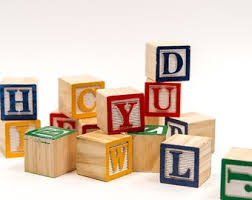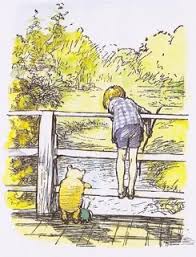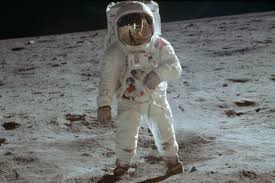Maria Montessori’s “follow the child” precept was especially cogent when parents knew where the child could reasonably be expected to be. Physically and intellectually, the world was a known, if not perfectly safe place. Parents staggered after toddlers as they waddled. If kids fell backwards on their padded bottoms, we were there to assess. No harm, no foul. Whereas if they were confused or hurt after a tumble, a quick cuddle of reassurance and they were again on their way. We knew where they could go and what they could do. We could go there too–our backs curved, our hands outstretched.

Educator, author, heroine
We encouraged our kids to play with wooden blocks and allowed them to bang on wooden spoons. In the unlikely eventuality that they picked up something dangerous, we were right there to substitute something soft for something sharp. Our realms–child and parent–were circumscribed.

I always took “follow the child” to mean “facilitate their exploration and understanding of the greater world.” Through ages and stages, little ones communicate what they need. Parents just have to be sensitive and attuned. When it is time to graduate to chapter books from picture books, children let you know that Winnie the Pooh should replace Fox and Socks.

and Pooh
We watched our preschoolers waddle around the park or playground, we did not take them on motorcycles to a traffic-filled highway near Three Mile Island. The Phantom Tollbooth is a good choice if The Jungle Book doesn’t get any traction. Whereas Whip Me, Schtup Me is a poor choice. Follow the child from Mogli’s Central India to Milo’s Dictionopolis. But don’t allow a second grader access to benzodiazepines or sex workers. What could be more obvious? Follow the child to safe, sensible, cuddly places.

from The Phantom Tollbooth
It is often remarked that a fifth grader’s smart phone has more computing power then Neil Armstrong had with him when he left our planet. Unrestricted access to what is available online is ill advised. You wouldn’t leave an illustrated copy of Whip Me, Schtup Me in the playroom. Why would you give your middle schoolers the opportunity to see that which they cannot possibly process?

I am often accused by my gentle readers of idealizing the past. Without antibiotics or refrigeration, life in late 19th century America was anything but easy. Infant mortality, deprivation, and starvation were available; out-of-season strawberries were not. Before the trans-continental railroad and the Sear Roebuck Catalogue, “waiting” was more common than “having.”
Blocking access to Whip Me, Schtup Me is as sensible as not giving brandy to an infant. Checking to ensure your children are clicking on their homework assignments rather than Unimaginably_Disgusting.com is as simple as following your toddlers.
If your children point out that “none of the other children have parents who check their browsing history,” you might respond that other families may bite the heads off live chickens rather than having family dinner for all you know and would you give me a hand with these dishes so we’ll have time to toss the Frisbee before it gets dark?”

Follow the child. Help her to grow up strong and healthy. In every generation and in every culture, in every country and in every setting, allow her to become a centered, powerful, independent adult. In the meantime, accept your sacred duty to keep her safe. She will tell you how. Follow her.



2 thoughts on “Safety First”
So much of life is confusing to me, but not this. Not keeping children, children. That I was clear on and even still it isn’t easy.
David, you are spot on as usual.
A child’s development can be equally mismanaged by the helicopter Moms & Dads. Probably the greatest gifts a parent can give a child is the opportunity to explore, and the opportunity to make mistakes.
On my 3-year old’s first day of swimming lessons, she insisted on gently slapping the water at the side of the pool for an entire hour, rather than follow the teacher’s instructions. We were within visual range of the swim class but were forbidden to disrupt. After class concluded, the swim teacher told us our daughter wasn’t interested in learning to swim this day.
On the way home, we asked Danielle if she enjoyed her first day swimming at the pool. She replied: “I wasn’t swimming! I was trying to see why the water drops splashed up when I splashed down!”
Evidently, this was her first Physics experiment.